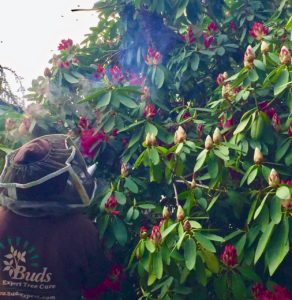Two days ago, I was doing a phone consultation with a writer who, among other things, was writing about bees. When I looked up from my notes, what did I see in our yard? A huge swarm of hundreds of…bees. I’ve never seen such a thing. It was strangely beautiful.
As I continued my consultation, the swarm lessened and eventually seemed to be down to a few dozen bees circling like electrons around an overgrown rhododendron. When I got off the phone, I went out to look closer and saw what is in the picture here: an upside down bee cone. It was two feet tall and just as wide at its widest part.
Fortunately, our neighbor used to have beehives and had the right equipment, as well as the desire to have one again. So last night he came and dropped the cone into a garbage bin and took the squirming mass off to put in one of his old bee boxes.
He missed a few, but over the past two days they’ve disappeared, so maybe they’re all together now.
Coincidentally, I’ve been reading Gabriel Garcia Marquez, in whose works the kind of coincidence in my first paragraph here happens all the time. Maybe more is at work in our world than we know.
Here a picture of the bees’ new home:






